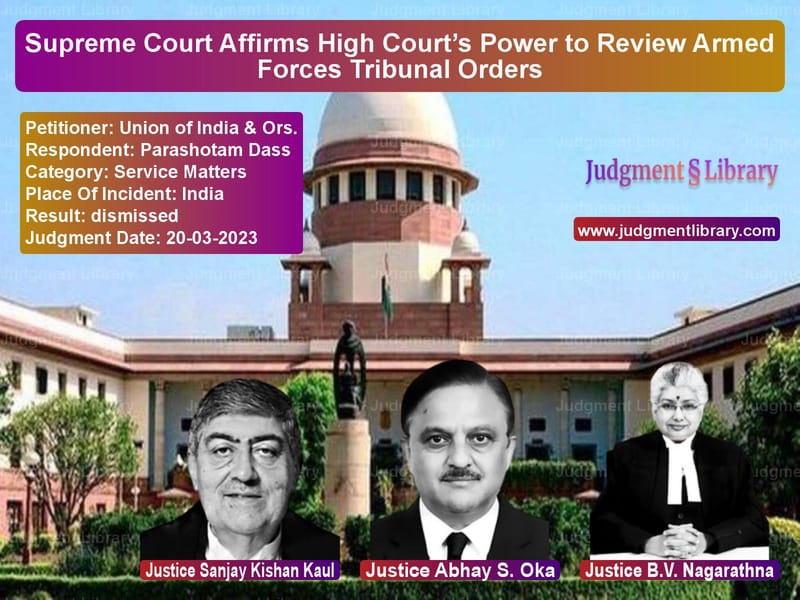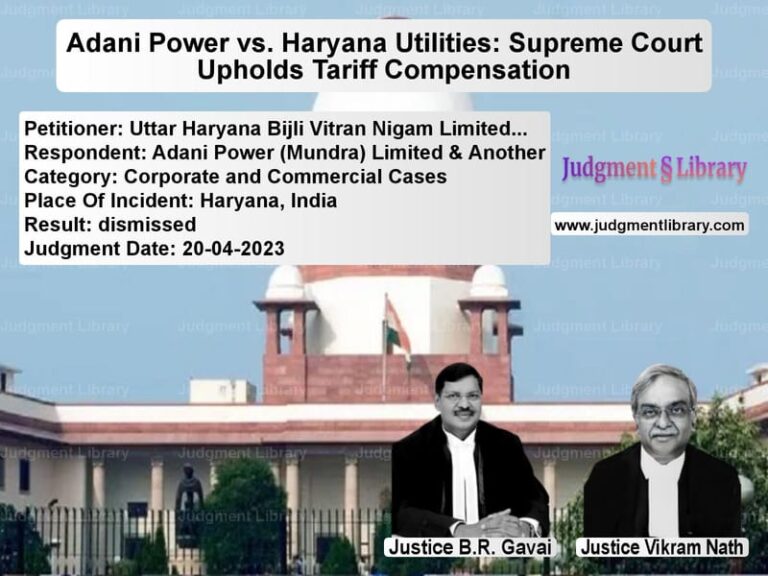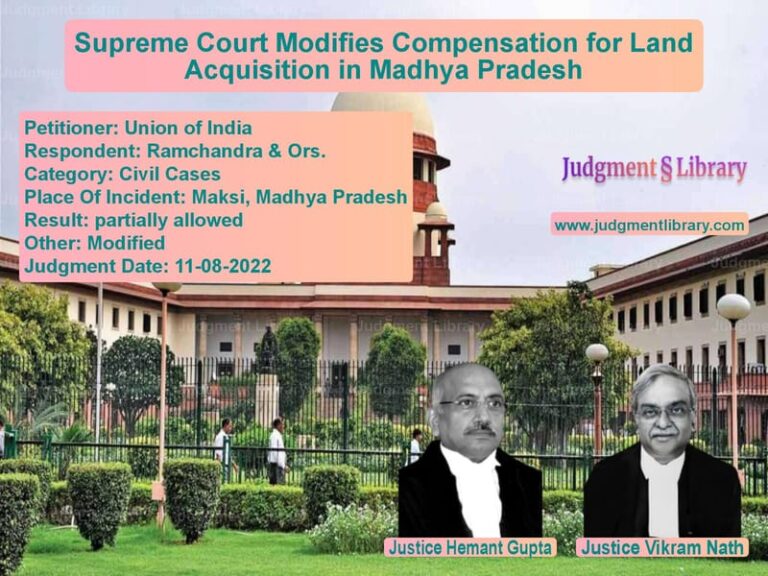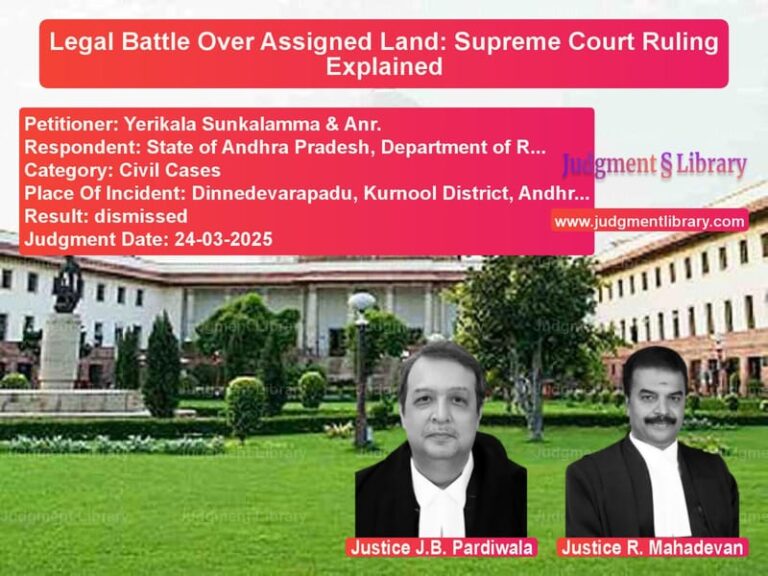Supreme Court Affirms High Court’s Power to Review Armed Forces Tribunal Orders
The Supreme Court of India has ruled in Union of India & Ors. v. Parashotam Dass that orders passed by the Armed Forces Tribunal (AFT) are subject to judicial review under Article 226 of the Constitution by High Courts. This landmark decision reaffirms the power of High Courts to hear challenges against AFT rulings, clarifying a crucial aspect of service law for armed forces personnel.
Background of the Case
The case arose when several service personnel challenged decisions of the AFT in different High Courts. The Union of India contended that AFT orders should only be appealable to the Supreme Court under Sections 30 and 31 of the Armed Forces Tribunal Act, 2007, and that High Courts had no jurisdiction under Article 226.
The petitioners argued that restricting access to High Courts violated their fundamental rights, especially when the Supreme Court’s appellate jurisdiction was limited to matters involving “a point of law of general public importance.”
Legal Issues Considered
- Whether High Courts have the power to review AFT decisions under Article 226 of the Constitution.
- Whether the appellate mechanism under Sections 30 and 31 of the Armed Forces Tribunal Act is sufficient to protect fundamental rights.
- Whether judicial review of AFT orders is part of the basic structure of the Constitution.
Arguments of the Parties
Petitioner’s Arguments (Union of India)
- The AFT was created as a specialized tribunal to handle service matters of armed forces personnel, and its decisions should be final.
- Under Article 136(2) of the Constitution, no appeal can be made directly to the Supreme Court against AFT orders.
- Sections 30 and 31 of the AFT Act provide a limited appeal mechanism, ensuring legal scrutiny without involving High Courts.
- Allowing High Courts to review AFT decisions would lead to multiple layers of litigation, delaying justice.
Respondent’s Arguments (Service Personnel)
- Judicial review under Article 226 is a basic feature of the Constitution and cannot be excluded by statute.
- The limitation of appeal to the Supreme Court only on “questions of law of general public importance” denies many service personnel a right to a fair hearing.
- The decision in L. Chandra Kumar v. Union of India (1997) clearly established that all tribunal orders are subject to High Court review.
- Service matters are personal in nature and often do not involve points of law of general public importance, making the Supreme Court’s appellate jurisdiction inadequate.
Key Observations of the Supreme Court
The Supreme Court delivered a detailed judgment, making several key observations:
- Article 226 Applies to AFT Orders: The Court ruled that High Courts have jurisdiction to review AFT decisions under Article 226, as it is a part of the basic structure of the Constitution.
- AFT Is Not a Substitute for High Courts: The judgment clarified that tribunals cannot completely replace the jurisdiction of constitutional courts.
- Limited Appeal to Supreme Court Is Insufficient: The Court noted that Sections 30 and 31 of the AFT Act only allow appeals in cases involving “questions of law of general public importance,” which is inadequate for most service disputes.
- Judicial Review Strengthens Justice: The ruling emphasized that judicial review by High Courts provides a necessary check on tribunal decisions, ensuring fairness.
Final Ruling
The Supreme Court upheld the power of High Courts to hear writ petitions challenging AFT decisions. The key conclusions were:
- High Courts retain jurisdiction under Article 226 to review AFT decisions.
- The AFT Act does not override constitutional provisions guaranteeing judicial review.
- Service personnel can approach High Courts if they believe their rights have been violated.
Accordingly, the Supreme Court dismissed the Union of India’s appeals and upheld the rights of service personnel to seek judicial review.
Implications of the Judgment
This ruling has significant implications for armed forces personnel and tribunal law:
- Ensures Access to Justice: Armed forces personnel can now seek redress in High Courts without being limited to the Supreme Court’s restricted appeal mechanism.
- Strengthens Judicial Review: The decision reinforces the fundamental right to judicial review, preventing unchecked tribunal decisions.
- Sets a Precedent for Other Tribunals: This ruling will influence cases involving other tribunals, ensuring they remain subject to High Court review.
- Maintains Constitutional Balance: The judgment upholds the Constitution’s framework by preserving the judiciary’s role in protecting individual rights.
Conclusion
The Supreme Court’s ruling in Union of India & Ors. v. Parashotam Dass is a landmark judgment affirming the fundamental right to judicial review. By allowing High Courts to review AFT decisions, the Court has ensured that service personnel are not left without recourse to justice. This decision reinforces the principle that tribunals cannot function as exclusive judicial bodies and must remain accountable to constitutional courts.
Petitioner Name: Union of India & Ors..Respondent Name: Parashotam Dass.Judgment By: Justice Sanjay Kishan Kaul, Justice Abhay S. Oka, Justice B.V. Nagarathna.Place Of Incident: India.Judgment Date: 20-03-2023.
Don’t miss out on the full details! Download the complete judgment in PDF format below and gain valuable insights instantly!
Download Judgment: union-of-india-&-ors-vs-parashotam-dass-supreme-court-of-india-judgment-dated-20-03-2023.pdf
Directly Download Judgment: Directly download this Judgment
See all petitions in Public Sector Employees
See all petitions in Employment Disputes
See all petitions in Disciplinary Proceedings
See all petitions in Judgment by Sanjay Kishan Kaul
See all petitions in Judgment by Abhay S. Oka
See all petitions in Judgment by B.V. Nagarathna
See all petitions in dismissed
See all petitions in supreme court of India judgments March 2023
See all petitions in 2023 judgments
See all posts in Service Matters Category
See all allowed petitions in Service Matters Category
See all Dismissed petitions in Service Matters Category
See all partially allowed petitions in Service Matters Category







